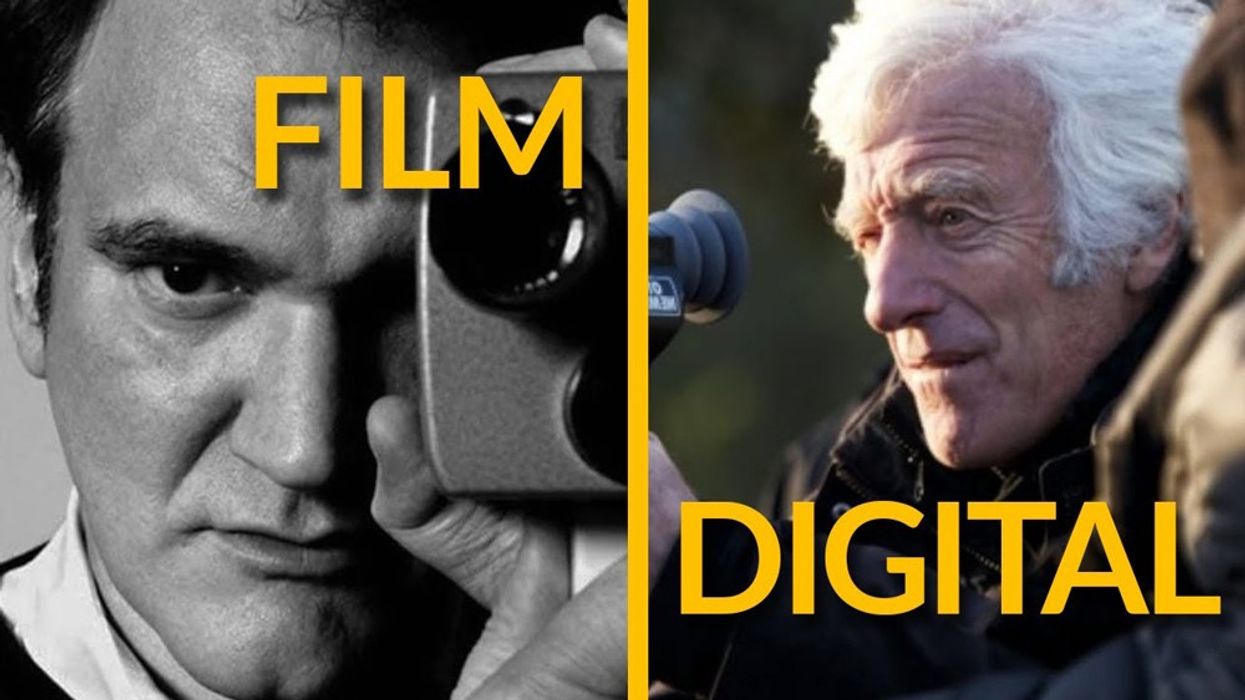Listen to Tarantino and Roger Deakins' Polarizing Discussion about Film Formats
The two top filmmakers drop some knowledge.

Although many agree that the discussion of shooting on film versus digital is worthwhile discussion but almost pointless to debate, we thought it was interesting that Quentin Tarantino and Roger Deakins can have such polarizing views when discussing this topic.
Tarantino has never swayed away from shooting on film, and he’s extremely passionate about continuing to do so. He argues that when you’re filming something on film, you are creating an illusion that creates the magic of movies.
“Everyone thinks that when you’re filming something on film, you are recording movement. You are not recording movement. You are just taking a series of still pictures. There is no movement in the movies at all. But when shown at 24 frames per second, through a lightbulb, it creates an illusion of movement, so thus, as opposed to a recording device, when you’re watching a movie, a film print, you are watching an illusion. And to me that illusion is connected to the magic of movies,” said Tarantino.
Tarantino is also extremely displeased about digital projection. He thinks that the loss of 35mm projection means that what he knew as cinema is dead.
He does mention that there are some advantages with digital, in that young filmmakers now have accessible tools to make a film much easier than before. However, he doesn’t understand why an established filmmaker would shoot on digital.
Roger Deakins, on the other hand, argues the complete opposite. He prefers shooting digital, as he doesn’t see a difference in it at all. He says that it gives him more options than what he can get with film. He loves the fact that you can see what you’ve just recorded, and that you can collaborate with the director with what you already have, as opposed to having sleepless nights worrying about the lab report the next day when shooting on film. He says that you can take it further because you know what you recorded, whereas on film, you are playing a little safe because you don’t fully know if you were over or underexposed in certain shots until the next day.
“I think digital cameras, digital projections, they are all tools. It depends on the project, you choose a different camera like you used to choose a different film stock. It’s going to be digital projection, that’s going to be the norm. That’s the way the world is going. You make it the best you can, and it’s certainly got a lot of advantages that film never had. Consistency being a really big one. It’s about the eye behind the camera, it’s not about the bloody technology, it’s about the person behind it," said Deakins.
Although Deakins often shoots on digital, at the end of the day, he doesn’t really care what he shoots on. He mentioned that the Coen brothers carefully approached him about the decision to shoot Hail, Caesar! on film, and he said that he didn't care and would shoot on an iPhone if the story called for it.
We think both have pros and cons, and they are just tools that should be used to fit a particular project, and choosing to shoot on film or digital should be an artistic or economical decision. Many cinematographers work this way.
Rodrigo Prieto, for example, mentioned that when filming Silence, he would use both film and digital at times when they were called for. He used film for scenes that he wanted to look a little rougher and grainier, and he used digital (Alexa) for candlelit scenes for the speed.
What do you think? Is the film versus digital still a necessary discussion, or is what's on the screen all that matters?
Let us know in the comments below.
For more videos about filmmaking, be sure to subscribe to my YouTube channel.











